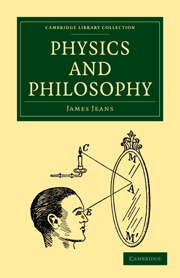Book contents
- Frontmatter
- Contents
- Preface
- I What are Physics and Philosophy?
- II How do we know? (Descartes to Kant; Eddington)
- III The two voices of Science and Philosophy (Plato to the present)
- IV The Passing of the Mechanical Age (Newton to Einstein)
- V The New Physics (Planck, Rutherford, Bohr)
- VI From Appearance to Reality (Bohr, Heisenberg, de Broglie, Schrödinger, Dirac)
- VII Some Problems of Philosophy
- Index
VII - Some Problems of Philosophy
Published online by Cambridge University Press: 07 September 2010
- Frontmatter
- Contents
- Preface
- I What are Physics and Philosophy?
- II How do we know? (Descartes to Kant; Eddington)
- III The two voices of Science and Philosophy (Plato to the present)
- IV The Passing of the Mechanical Age (Newton to Einstein)
- V The New Physics (Planck, Rutherford, Bohr)
- VI From Appearance to Reality (Bohr, Heisenberg, de Broglie, Schrödinger, Dirac)
- VII Some Problems of Philosophy
- Index
Summary
We have now concluded our summary of the findings of modern physics, and may turn to consider how these findings affect the practical problems of philosophy and of everyday life. But let us first recapitulate the conclusions we have reached in our scientific discussion.
Recapitulation
Because we are human beings and not mere animals, we try to discover as much as we can about the world in which our lives are cast. We have seen that there is only one method of gaining such knowledge—the method of science, which consists in a direct questioning of nature by observation and experiment.
The first thing we learn from such questioning is that the world is rational; its happenings are not determined by caprice but by law. There exists what we have called a ‘pattern of events’, and the primary aim of physical science is the discovery of this pattern. This, as we have seen, will be capable of description only in mathematical terms.
The new quantum theory explained in the preceding chapter has provided a mathematical description of the pattern of events which is believed to be complete and perfect. For it enables us—in principle at least—to predict every possible phenomenon of physics, and not one of its predictions has so far proved to be wrong. In a sense, then, we might say that theoretical physics has achieved the main purpose of its being, and that nothing remains but to work out the details.
- Type
- Chapter
- Information
- Physics and Philosophy , pp. 174 - 218Publisher: Cambridge University PressPrint publication year: 2009First published in: 1942



